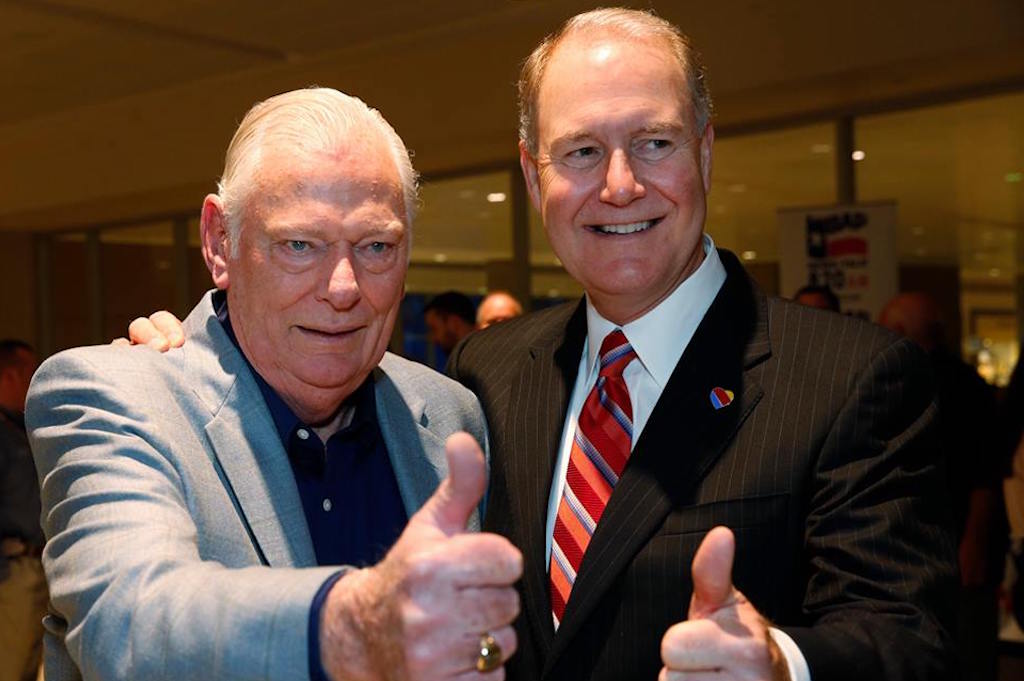How Herb Kelleher Made Southwest a Vexing Problem for Online Travel

Skift Take
Southwest co-founder Herb Kelleher, who passed away last week, deservedly earned heartfelt plaudits from airline partners and competitors of various persuasions.
Kelleher, who was executive chairman and/or CEO of the airline for three decades, ending in 2008, practically invented low-cost carriers, and created a beloved airline. Southwest is one of the largest airlines in the United States, never went bankrupt, as did many of its peers, and has been profitable for 46 years in a row. It's an unparalleled record in U.S., if not global, aviation.
We reached out to online and business travel leaders whose tenures overlapped with Kelleher's, and they universally praised his legacy. But Kelleher's track record also made Southwest a formidable obstacle to their goals of creating comprehensive solutions for their customers.
For example, beginning with Kelleher, Southwest shunned giving its flights and fares to online travel agencies; most global distribution systems, with the exception of a dribble of inventory to its reservations system provider, Sabre; and corporate booking tools.
Kelleher, and his successors insisted that consumers could only book Southwest online at Southwest.com or its Swabiz corporate travel portal, which launched in May 2000.
The Southwest issue for online travel persists today, where Kayak provides the airline's schedules but no fare information. Expedia doesn't even show Southwest schedules, and many corporate booking tools don't offer Southwest flights, or resort to clunky and unauthorized workarounds to get them.
Jeff Katz, the first CEO of Orbitz, a former CEO of Swissair and current founder and CEO of Journera, told Skift of his respect for Kelleher.
“Herb Kelleher was a remarkable leader of people and built what is today’s largest (by enplanements) and most consistently profitable airline," Katz said. "Southwest is also the only airline that existed prior to 2001 that didn’t go bankrupt. He had a laser-like focus on caring for customers and the importance of the Southwest employee as the essential ingredient of their brand. He was one of at most three innovators (along with Pan Am founder Juan Trippe and former American Airlines chairman Bob Crandall) who inspired what the airline world is today.”
All of this praise comes from Katz despite the fact that Southwest sued Orbitz soon after its launch in 2001 when the online travel agency posted Southwest's schedules and fares without permission.
Southwest's penchant for issuing cease and desist letters and filing lawsuits to block any use of its proprietary information by metasearch sites, online travel agencies, and startups is well-documented. Startups such as TripIt, acquired by Concur, and other sites seeking to track Southwest Rewards, publish fare alerts, or streamline the airline's boarding process for flyers have born the brunt of the airline's commitment to defend its rights through litigation.
Krista Pappas, a senior vice president at Lola, said Southwest's distribution practices over the years ensured that metasearch would not be comprehensive because it couldn't offer users flights from one of the largest U.S. airlines.
Pappas said when she previously worked as global travel industry managing director at Microsoft's Bing and chief strategist at Smarter Travel Media, Southwest executives would politely and respectfully listen to every request about getting access to Southwest flights, but always said "no."
"When I think back about all of the hours, time and energy we spent trying to negotiate a way to get Southwest into the mix, it is heartbreaking," Pappas said. Smarter Travel was one of those online travel companies to receive a cease and desist letter from Southwest.
Pappas said that Southwest's strategy also made it harder to work with other airlines because they saw Southwest's distribution approach, and decided they might not give Bing or Smarter Travel all of their inventory. "Other carriers became schizophrenic on any given day," she said. "Because they were in both camps, saying maybe we're not going to give you everything on our website."
At some points, Pappas said, Bing, which offered flight and hotel metasearch, even tried to pay Southwest — rather than be compensated by the airline — to offer Southwest's flights, but that was a nonstarter, as well.
Southwest's position to abstain from distributing its flights and fares outside its own channels impacted corporate travel, too.
Ellen Keszler, who's been on many hotel and travel startup boards and is formerly president of Travelocity Business, said Southwest pioneered direct booking — years before the big chains made it a priority. She noted that Kelleher was a low-cost carrier pioneer, but Southwest in the early 2000s wouldn't give Sabre-spawned Travelocity Business the airline's flights even though Sabre hosted Southwest's passenger reservations system.
None of the online travel veterans we spoke with had a cross word to say about Kelleher; they unanimously praised him.
Jim Davidson, the CEO of Farelogix, recently acquired by Sabre, said, "I only met him a few times, but I learned a lot from him: That it was OK to continuously challenge conformity. That part of him will always be remembered and passed along."
Likewise Priceline.com founder Jay Walker, chairman and CEO of Upside Travel, said Kelleher loomed larger than life. This praise comes despite the fact that Southwest wouldn't sell its flights on Priceline.
"He represented the ideal that said the upstart could make a better product by innovating in ways that just didn’t seem in line the conventional wisdom (he was point to point, ran a fun airline, no boarding assignments, standardized fares, no change fees etc.)," Walker said. "He didn’t just do things differently he made them work for the airline and the customer — and customers still love them by the millions — quite a feat. He never went bankrupt and he was more profitable in many years than everyone else together. That’s quite a legacy and he inspired millions of entrepreneurs. I’d like to have a dollar for every one that was inspired by Herb and the team he built. Oh, and a woman as president (Colleen Barrett) in a male-dominated industry. Truly a remarkable American."
Rich Barton, the founder of Expedia and current co-founder and executive chairman of online real estate marketplace Zillow, said he never met Kelleher, and isn't sure what the strategic post-mortem should be on Southwest's "decision not to participate in the online travel agencies."
Said Barton: "It was probably smart given such a differentiated product and strong brand. All others were commodities and unloved."
To build a perennially profitable airline that has legions of loyal passengers obtained predominantly through your own sales channels, now that is an enviable legacy.





